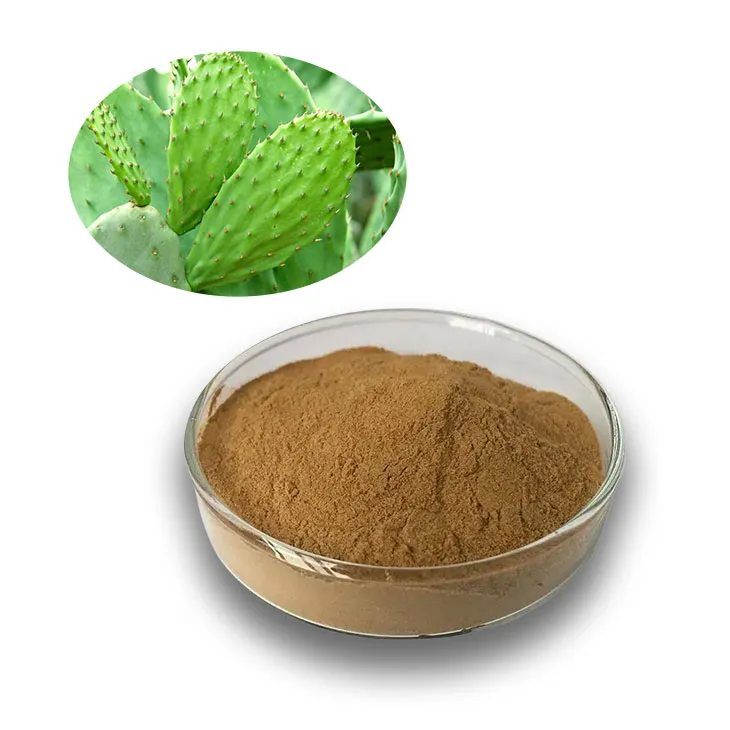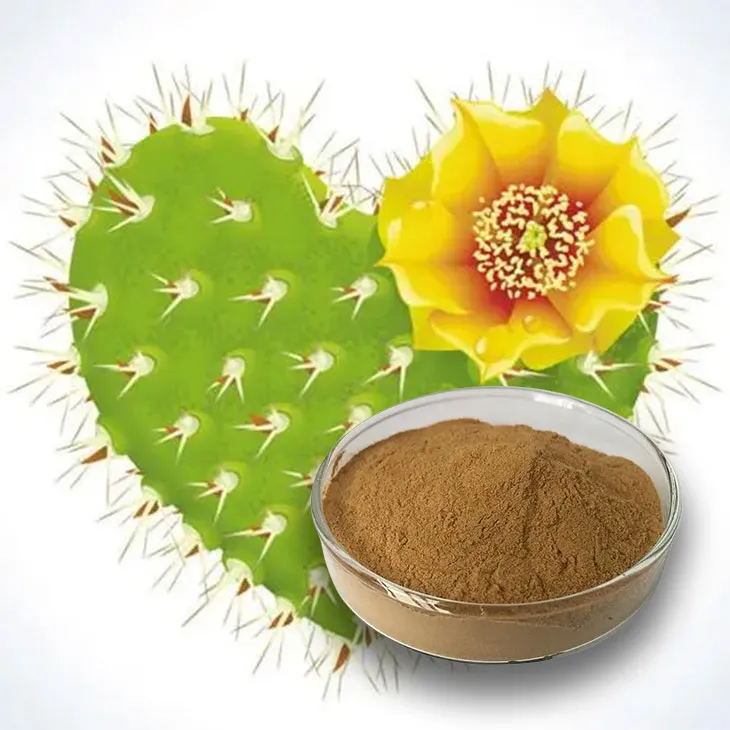- 0086-571-85302990
- sales@greenskybio.com
Cactus Extract: Should You Use It for Skin Care?
2024-11-13

1. Introduction
In the world of skincare, new ingredients are constantly emerging, each claiming to offer unique benefits. One such ingredient that has been gaining attention lately is Cactus Extract. With its potential to transform the skin, it's important to understand what it can do and whether it's a suitable addition to your skincare routine. This article will delve deep into the world of Cactus Extract in skincare, exploring its traditional uses, scientific research, and potential risks.

2. Traditional Uses of Cactus in Skin - related Remedies
2.1 Native American Cultures
In Native American cultures, cactus has long been used for various skin - related purposes. For example, the prickly pear cactus was often used to soothe burns and cuts. The gel - like substance inside the cactus was carefully extracted and applied directly to the affected area. This traditional use was based on the belief that the cactus had natural healing properties that could accelerate the skin's recovery process. The knowledge was passed down through generations, and it still holds significance today in understanding the potential of Cactus Extract in skincare.
2.2 Mexican Folk Medicine
In Mexican folk medicine, cactus has been a staple for skin health. Different types of cacti were used to treat skin irritations, such as rashes and insect bites. The juice of certain cacti was believed to have anti - inflammatory properties, which could reduce redness and swelling. Additionally, cactus was sometimes used in poultices to treat more severe skin conditions. These traditional uses in Mexican folk medicine provide valuable insights into the possible benefits of cactus extract for modern skincare.
2.3 Asian Traditional Medicine
In some Asian traditional medicine practices, cactus has also found its place in skin - related remedies. Although not as commonly used as in Native American or Mexican cultures, certain cacti were incorporated into herbal mixtures for skin ailments. These mixtures were often used to improve the overall complexion and promote healthy skin. The use of cactus in Asian traditional medicine further emphasizes the global interest in the potential of cactus for skincare.
3. Modern Scientific Research on Cactus Extract
3.1 Nutrients in Cactus Extract
Cactus extract is rich in a variety of nutrients that are beneficial for the skin. It contains vitamins such as vitamin C, which is well - known for its role in collagen synthesis. Collagen is essential for maintaining skin elasticity, and by promoting its production, vitamin C in cactus extract can help keep the skin firm and youthful. Additionally, cactus extract may also contain vitamin E, an antioxidant that protects the skin from free - radical damage. These vitamins work together to nourish the skin from within and improve its overall health.
3.2 Bioactive Substances and Their Effects
Cactus extract also contains bioactive substances that have specific effects on the skin. One such substance is betalain, which is responsible for the vibrant colors in some cacti. Betalain has been found to have antioxidant and anti - inflammatory properties. This means that it can help reduce signs of aging, such as wrinkles and fine lines, by combating oxidative stress and inflammation in the skin. Another bioactive substance in cactus extract is polysaccharides. These can help to hydrate the skin, improving its moisture - retaining capacity and giving it a plump and healthy appearance.
3.3 Skin Elasticity Improvement
The combination of nutrients and bioactive substances in cactus extract makes it a potential candidate for improving skin elasticity. As mentioned earlier, the vitamin C in cactus extract promotes collagen synthesis. Collagen is a key component of the skin's structure, providing it with the necessary support to maintain elasticity. Additionally, the polysaccharides in cactus extract can also contribute to skin elasticity by enhancing the skin's hydration levels. When the skin is well - hydrated, it is more elastic and less prone to sagging.
3.4 Anti - Aging Effects
Cactus extract has shown promising anti - aging effects in scientific studies. The antioxidant properties of betalain and vitamin E help to neutralize free radicals, which are unstable molecules that can damage skin cells and accelerate the aging process. By reducing the oxidative stress on the skin, cactus extract can slow down the appearance of wrinkles, fine lines, and age spots. Moreover, the anti - inflammatory properties of cactus extract can also contribute to a more youthful - looking skin by reducing redness and puffiness.
3.5 Protection from Environmental Damage
In today's environment, the skin is constantly exposed to various pollutants, UV radiation, and other harmful factors. Cactus extract can offer protection against such environmental damage. The antioxidants in cactus extract can scavenge free radicals generated by environmental stressors, preventing them from causing damage to the skin cells. Additionally, the anti - inflammatory properties can help to soothe the skin after exposure to environmental irritants, reducing the risk of developing skin problems such as eczema or dermatitis.
4. Potential Risks Associated with Cactus Extract
4.1 Quality Variability among Products
One of the major concerns with cactus extract in skincare products is the variability in quality among different products. Since the extraction process and the source of cactus can vary greatly, the quality and effectiveness of the extract can also differ significantly. Some products may use low - quality cactus extract that has been poorly processed, which may not provide the expected benefits. It is important to choose skincare products from reliable brands that ensure high - quality cactus extract.
4.2 Allergic Reactions
Although cactus extract is generally considered safe for most people, there is still a risk of allergic reactions. Some individuals may be allergic to certain components in cactus extract, such as the proteins or other bioactive substances. Allergic reactions can range from mild skin irritation, such as redness and itching, to more severe symptoms like swelling and difficulty breathing in extreme cases. Before using a skincare product containing cactus extract, it is advisable to do a patch test on a small area of skin to check for any allergic reactions.
4.3 Interaction with Other Skincare Ingredients
Cactus extract may also interact with other skincare ingredients, either enhancing or reducing their effectiveness. For example, if used in combination with certain acids, such as glycolic acid or salicylic acid, the pH balance of the product may be affected, which could potentially lead to skin irritation. It is crucial to understand the compatibility of cactus extract with other ingredients in your skincare routine to ensure optimal results and avoid any negative interactions.5. Conclusion
Cactus extract has a long history of traditional use in skin - related remedies across different cultures. Modern scientific research has also revealed its potential in improving skin elasticity, reducing signs of aging, and protecting the skin from environmental damage. However, there are also potential risks associated with cactus extract, such as quality variability, allergic reactions, and interactions with other skincare ingredients. When considering whether to use cactus extract for your skincare needs, it is important to weigh the benefits against the risks. If you choose to use it, make sure to select high - quality products from reliable brands and do a patch test to check for allergic reactions. With careful consideration, cactus extract can potentially be a valuable addition to your skincare routine.
FAQ:
1. What are the traditional uses of cactus in skin - related remedies?
In some cultures, cactus has been traditionally used to soothe irritated skin, treat minor cuts and burns. For example, the gel - like substance inside certain cacti was applied topically to provide a cooling effect and promote wound healing. However, these uses were mainly based on anecdotal evidence in traditional medicine rather than scientific research at that time.
2. How does cactus extract improve skin elasticity?
Cactus extract contains nutrients and bioactive substances. Some of these substances, like polysaccharides, can help to hydrate the skin. Well - hydrated skin is more likely to be elastic. Also, certain compounds in cactus extract may stimulate the production of collagen and elastin in the skin. Collagen and elastin are crucial for maintaining skin's firmness and elasticity.
3. Can cactus extract really reduce signs of aging?
There is some evidence from modern scientific research that suggests cactus extract might be able to reduce signs of aging. The antioxidants present in cactus extract can combat free radicals in the skin. Free radicals are known to cause oxidative stress which can lead to premature aging, such as the formation of wrinkles and fine lines. By neutralizing these free radicals, cactus extract may help to keep the skin looking younger.
4. How does cactus extract protect the skin from environmental damage?
The bioactive compounds in cactus extract can act as a barrier on the skin. They can help to block harmful environmental factors such as UV radiation and pollutants. For instance, some substances in cactus extract may absorb or scatter UV rays, reducing their penetration into the skin. Also, they can prevent pollutants from adhering to the skin and causing damage.
5. What are the potential risks of using cactus extract in skincare?
One of the main potential risks is the variability in quality among different products. Poor - quality cactus extract may contain contaminants or not have the right concentration of active ingredients. Some people may also be allergic to cactus extract, which could lead to skin irritation, redness, or itching. Additionally, if the extraction process is not properly carried out, it may affect the effectiveness and safety of the cactus extract in skincare products.
Related literature
- The Bioactive Compounds of Cactus and Their Potential in Skincare"
- "Cactus Extract: A New Frontier in Anti - Aging Skincare"
- "Evaluating the Safety and Efficacy of Cactus - based Skincare Products"
- ▶ Hesperidin
- ▶ Citrus Bioflavonoids
- ▶ Plant Extract
- ▶ lycopene
- ▶ Diosmin
- ▶ Grape seed extract
- ▶ Sea buckthorn Juice Powder
- ▶ Fruit Juice Powder
- ▶ Hops Extract
- ▶ Artichoke Extract
- ▶ Mushroom extract
- ▶ Astaxanthin
- ▶ Green Tea Extract
- ▶ Curcumin
- ▶ Horse Chestnut Extract
- ▶ Other Product
- ▶ Boswellia Serrata Extract
- ▶ Resveratrol
- ▶ Marigold Extract
- ▶ Grape Leaf Extract
- ▶ New Product
- ▶ Aminolevulinic acid
- ▶ Cranberry Extract
- ▶ Red Yeast Rice
- ▶ Red Wine Extract
-
Phyllanthus Emblica Extract
2024-11-13
-
Astaxanthin
2024-11-13
-
Black Rice Extract
2024-11-13
-
Shikonin
2024-11-13
-
American Ginseng Root Extract
2024-11-13
-
Marigold Extract
2024-11-13
-
Polygonum Cuspidatum Extract
2024-11-13
-
Pine bark Extract Powder
2024-11-13
-
Kupilu Extract
2024-11-13
-
Horse Chestnut Extract
2024-11-13





















